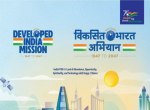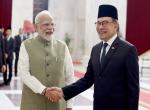Gujarat has been touted around as a State steeped in communalism, with a government which is right wing, extremist Hindu, anti Muslim and totally communal in outlook. The Congress, on the other hand, projects itself as the party which is secular, pro-minority and, in particular, totally protective of the Muslims. The pro-Muslim secular stance of the Congress formed the main plank of its election campaign in the recent elections in Uttar Pradesh, the end result of which was that the Congress got only twenty-six seats in the State Legislative Assembly and trailed behind BJP to emerge as number four in the electoral race. By contrast in the allegedly communalised State of Gujarat the Mephistopheles of Indian politics, Narendra Modi gave tickets to and was able to have elected over a hundred Muslim candidates in local government elections. Anti Sikh riots took place all over the country in 1984 and at that time the Congress ruled at the Centre and in many other States in India. Not a single conviction has been obtained for these horrendous riots in which in Delhi alone three times more Sikhs were killed than the Muslims in Gujarat in 2002. The entire Hindu Pandit population of the Kashmir Valley was driven out and they became refugees in their own country. Not even one of the culprits of this ethnic cleansing has even been prosecuted, leave alone been convicted. The Pandits even today are either living in refugee camps or are scattered throughout the country. Neither the activists who claim secular credentials nor government has raised a finger to help these refugees.
In 1992-93 the worst rioting post Babri Masjid demolition occurred in Maharashtra, notably in Bombay city. The State was then under Congress rule. No one has been convicted for these riots and the Commission headed by Justice Shri B.N. Srikrishna gave a very categorical report, in which officers who failed in their duty were identified and named, but has been completely ignored by government. Both the Congress and NCP in their election manifestos promised to implement the recommendations of the Srikrishna Commission, but nothing has happened in this behalf despite the fact that it is a coalition of the Congress and NCP which is in power in Maharashtra.
The latest in the series is the complete break-down of law and order in four districts of Assam, with Bodo tribals being in direct conflict with Muslims. Allegedly these Muslims are illegal migrants from Bangladesh whose presence is resented by the Bodos, which has resulted in direct ethnic conflict. Several hundred villages have been burnt down and lakhs of people displaced. There have been Bodo casualties also but, as happens in many communal conflicts, it is the Muslims who had suffered the most. Even the international community has taken note of what has happened in Assam, with unfavourable comments about how we have handled the situation. The Chief Minister of Assam, who is a Congress man, had at an early stage reacted to press reports that Assam was burning by stating that the media had exaggerated as usual and that only three districts were aflame. Considering the size and population of an Indian district the Chief Minister virtually confessed that an area containing a population of five to six million people was seriously affected and that he considered this as a fairly minor event. This could only be expected of a Chief Minister who, in order to win the election, had played the contrary communal card by ignoring the Muslims to win the Hindu votes which might otherwise have gone to the BJP. Can such a government be considered secular?
What about our friends from the Left? Undoubtedly the Left Front Government in West Bengal had a popular image of secularism, so much so that in 1984-85 the Sikhs as a community publicly honoured the then Chief Minister, Jyoti Basu, for ensuring security for the Sikhs and maintaining communal harmony. It is also a fact that West Bengal remained relatively free of Hindu-Muslim conflict during the Left Front rule. Towards the end this image had begun to change and that is because massive land acquisition in Nandigram largely affected Muslim cultivators and the Trinamool Congress was able to project this, at least partially, as the anti Muslim policy of the Left Front. The fact that this was not true is not really relevant in the electoral politics of the India of today. However, in Kerala the Left Front had no inhibition whatsoever in playing the communal card and when it suited LDF it allied itself with the Indian Union Muslim League. Surprisingly in a State in which the BJP has a poor political presence RSS is quite strong, partly because of communal Muslim politics¸ which is why there have been a number of communal clashes in Kerala, especially in the old Madras Presidency Malabar District (now divided into several districts). LDF did little to oppose such communalism, which does not speak well for its secular credentials.
Let us revert to Gujarat. No one can be an apologist for what happened in 2002 and in one letter to the Prime Minister I have said that had I been Governor of the State I would have strongly advised the Chief Minister and actually ordered the Chief Secretary and the Director General of Police to restore order immediately. I would have also gone around the State and if I saw any rioting I would have ordered my escort to fire on the mobs and disperse them. This would not have gone down well with the Government of India and would have probably resulted in my immediate removal, but nevertheless this is how I would have interpreted Article 154 of the Constitution which vests the executive power of the State in the Governor and also acted according to the oath sworn by me under Article 159 which required me to preserve, protect and defend the Constitution and the law. I would have seen it as my duty to remind the Chief Minister that the law required him to maintain law and order and I would certainly consider it a breakdown of the Constitution if the State itself became a party to lawlessness. At the same time it is equally a fact that neither in Delhi, nor in Maharashtra, nor in Assam, nor in Rajasthan during the recent conflict between Jats and Meos has any worthwhile judicial action been initiated and large-scale conviction of wrongdoers obtained. No doubt Nitish Kumar in Bihar, who is truly secular, has been able to take effective legal action. Otherwise Gujarat is the only State in India where six successful cases have been fought against the perpetrators of the 2002 riots and a large number of people have been convicted. This is as true of the Best Bakery case as it is of the Naroda Patiya case in which thirty-two persons, including an ex-minister, have been convicted. A great deal of credit must go the Supreme Court which has forced the Gujarat Government to act, has activated the Gujarat Police which bore the brunt of the investigation and set up an impartial Special Investigation Team (SIT) which has spearheaded the investigation. Everyone is considering the convictions as a set back to Narendra Modi. I disagree with this because the Gujarat Government has, however reluctantly, gone along with investigations, has not obstructed them, nor interfered with the course of justice. Even in the Sohrabuddin case, where the ex-Minister of State for Home, a DIG and other police officers are facing murder trials, the Gujarat Police has not destroyed the evidence and, therefore, the relevant SIT has been able to proceed with the investigation. The encouraging thing about Gujarat is that a largely Hindu Supreme Court, an overwhelmingly Hindu Gujarat Police and the SIT set up by the Supreme Court, Hindu judges such as Jyostna Yagnik have brought justice of the victims of the 2002 riots and convicted a large number of persons involved in these riots. So long as we have this example we can be assured that India has institutions which are secular, though unfortunately none of these are political. Real secularism requires the political class to also be on board.
How communal is Narendra Modi? To his opponents he is the communal devil incarnate, who is unrepentant about what happened in 2002, who refuses to apologise to the Muslims and whose ministers interfered with the maintenance of law and order during that crucial period. But is there another side to Modi? In the State of Gujarat in 2002 the whole of Saurashtra remained largely peaceful and the district administration and the police intervened strongly and effectively to keep the area peaceful. This was true of Kutch also. North Gujarat, mainly Sabarkantha and Banaskantha Districts, remained peaceful despite the substantial Muslim population there. The Central and Southern Districts of Gujarat, in particular Ahmedabad, Kheda, Baroda, Panchmahals, Bharuch and to some extent, Bulsar and Surat were the focus of rioting. This region has had communal conflict even during British days and the worst communal riots in the history of Gujarat occurred in 1969 in Ahmedabad when Hitendra Desai was the Chief Minister. I had written to Dr. Manmohan Singh when he became Prime Minister that the history of this part of Gujarat is such that regardless of which party in power, this region will remain prone to communal tension. I suggested that a person of the calibre of P.S. Appu, IAS should be asked to hold a free ranging administrative enquiry into the causes of communal unrest in these districts and to look into why the district administration and the police did not react strongly and positively to a communal situation. If the root cause of Hindu-Muslim animosity could be identified and then removed Gujarat would be peaceful. Narendra Modi was a phenomenon but he was not the cause of communal strife in these districts of Gujarat. The underlying cause is much older and deeper. The Prime Minister responded favourably but did nothing and, therefore, we still do not know why this region of Gujarat has Hindu-Muslim animosity.
Narendra Modi has not reached out to the Muslims as such, but he has kept RSS, VHP, BKS and the Bajrang Dal under strict control since 2002, which is one reason why rabble rousers such as Pravin Togadia dare not open their mouths in Gujarat. Since 2002 there have been no communal riots in Gujarat and whatever his detractors might say, Gujarat is a relatively corruption-free State with a service oriented, efficient government which has accelerated the pace of development. Whereas there is no special effort to bring the Muslims on board, Muslims have not been denied the fruits of development and many of them have prospered. Whereas the Muslims are hardly ever likely to forgive Narendra Modi for the 2002 riots there are many of them who believe that one must not remain in a period mourning for the past and must move forward to a new future. That is why paradoxically Gujarat is the one State with a BJP Government where at least some Muslims have participated in local government elections and a small section has even voted for Narendra Modi’s party. They certainly did not do so for Sonia Gandhi’s allegedly secular Congress in Uttar Pradesh.
Amongst so-called secular parties there is a mistaken notion that any secularism which is not pro Muslim loses votes. The vast majority of the people of India are Hindu and if a polarisation of their votes takes place in which the present fragmented Hindu votes become concentrated, can we ever keep extremist Hindu parties out of power? Therefore, India’s best bet is the politics of genuine secularism in which government follows policies which give equal opportunities to all communities, without singling out one for opprobrium and another for appeasement. Narendra Modi says that he does not speak for any community but is concerned only about the ‘asmita’ of five and a half crores Gujaratis. Is it not about time that political parties begin talking about the ‘asmita’ of 110 crores Indians without dividing them into religion, caste, class, or region?
The Bharat Ratna is an individual award given to individuals who have achieved high distinction and merit in the service of the country. The George Cross is the highest gallantry award during peace time for defence personnel and for civilians during war and peace, which the British can give. It is an individual award and is equivalent to the Ashok Chakra in India. However, because the people of the Island of Malta stood collectively with the British against the Germans in the Second World War and exhibited the highest degree of gallantry under massive bombardment, the Island of Malta was collectively given the George Cross. On this analogy the Supreme Court of India deserves the Bharat Ratna for the manner in which it has upheld, protected and enhanced the status of the Constitution of India and in particular the secular nature of this republic. My respectful submission to the President and to the Government of India would be that in the Republic Day awards to be announced on 26th January 2013 they may collectively award to the Supreme Court the Bharat Ratma as a token of gratitude of this nation for being the one pillar of the Constitution which has remained true to its salt. No greater tribute could be paid to what I consider the best Supreme Court in the whole world.
Published Date: 4th September 2012









Post new comment